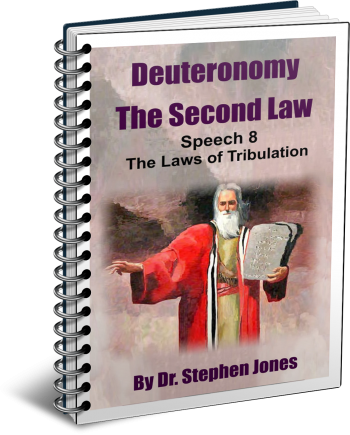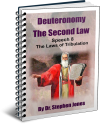Latest Posts
View the latest posts in an easy-to-read list format, with filtering options.

A commentary on the eighth speech of Moses in Deuteronomy 27-28. The book of Deuteronomy is a series of 12 speeches that Moses gave just before his death at the end of Israel's wilderness journey.
Category - Bible Commentaries

The curses for disobedience reach their climax in Deut. 28:66-68,
66 So your life shall hang in doubt before you; and you shall be in dread night and day, and shall have no assurance of your life. 67 In the morning you shall say, “Would that it were evening!” And at evening you shall say, “Would that it were morning!” because of the dread of your heart which you dread, and for the sight of your eyes which you shall see.
Moses told the people that when God imposed the iron yoke upon them, the nation would be destroyed, many people would be killed, and many would be deported to other lands, either as slaves or resettled as captives in other parts of the world. In such time of war and siege, no one could know for sure who would live or die. Everyone’s world is turned upside down in such turbulent times, and fear becomes the predominant emotion in nearly all of the people.
In times like that, faith is the only thing that can sustain people. Mere positive thinking is inadequate. Faith comes by hearing (Rom. 10:17), which is also obedience. Shema means both to hear and to obey. Thus, faith manifests as obedience, which brings the blessings of God. In a time of siege, where God has decreed that the nation must come under an iron yoke on account of national disobedience, the remnant of grace are those who truly serve God in obedience to His voice. Therefore, they have the right to expect God’s protection, even in time of divine judgment.
We read in Ezekiel 9:4 that God seals a remnant to protect them in such times. The remnant submits to the divine judgment and is willing to go into captivity. Daniel was an example of this, for he was taken to Babylon some years before Jerusalem was destroyed. Jeremiah, too, was treated well by the Babylonians and was even allowed to travel wherever he wished, because he obeyed the word of the Lord.
Ezekiel 6:7, 8 says,
7 And the slain will fall among you, and you will know that I am the Lord. 8 However, I shall leave a remnant, for you will have those who escaped the sword among the nations when you are scattered among the countries.
In Ezekiel 5, the prophet was told to cut his hair and to divide it in three piles. One pile was to be burned, one was chopped up by a sword, and the other was scattered to the wind. This prophesied the different fates of the people in Jerusalem (Ezekiel 5:5). However, Ezekiel was also told to reserve a few hairs to represent the remnant:
3 Take also a few in number from them and bind them in the edges of your robes. 4 And take again some of them and throw them into the fire, and burn them in the fire; from it a fire will spread to all the house of Israel.
Here the remnant is separated from the main body of Israelites and placed in the robe of the prophet, who represents God in this word picture. They are divinely protected, because they have been “devoted” to God according to the law of devotion. To be devoted legally means to be placed under God’s direct ownership and authority.
Some of these devoted ones are also thrown into the fire. This pictures the fact that many of the remnant are persecuted by the main body of people, even though they are under God’s personal protection. It does not mean that God is helpless to protect them, but rather that God sends them into certain death for a very specific reason. Because they are burned, “from it a fire will spread to all the house of Israel.”
When God pronounces judgment upon the nation, He then sends a prophet or one of the remnant to them in order to allow the nation an opportunity to obtain mercy. Such is the merciful character of God. For example, when David sinned, God sent Nathan to him with a story about a rich man who took his poor neighbor’s only lamb in order to feed his guest (2 Samuel 12:1-6). David’s angry response set the level of his own judgment, for he himself was that “rich man” (2 Sam. 12:7).
David, of course, did not put Nathan to death for his insolence, for in spite of his sin, David was a man after God’s own heart. Most of the time, however, the prophets and the remnant of grace are judged and killed by the religious leaders. They do not realize that they are wasting their final opportunity to be merciful so that they themselves may obtain mercy from God (Matt. 5:7).
And so, it cannot be assumed that one’s faith and obedience will prevent death. God has called many to be martyrs in order that God might give opportunity to extend mercy to those who are in danger of impending judgment. The remnant of grace knows, however, that they are in God’s hands, and that if they are killed, it will certainly work out for good, insofar as the divine plan is concerned.
Indeed, there is another fire that his death will cause. He receives the baptism of fire from God, which initiates a move of the Holy Spirit into the nation. This is the positive side of the “fire” that springs from the death of the remnant.
The faith of the overcoming remnant overrides the pervading fear that grips the nation or even the church in time of war.
Moses concludes in Deut. 28:68,
68 And the Lord will bring you back to Egypt in ships, by the way about which I spoke to you, “You will never see it again!” And there you shall offer yourselves for sale to your enemies as male and female slaves, but there will be no buyer.
When God brought Israel out of Egypt, He redeemed them from captivity and slavery. Moses tells us that God promised Israel, “You will never see it again!” And yet we find that an iron yoke captivity means that “the Lord will bring you back to Egypt.” Is this a contradiction? Not at all. First of all, the word “never” in the NASB is from the Hebrew word lo, which means “not.” It should read, “You will not see it again.”
Secondly, this promise was conditional upon their obedience. All of God’s blessings under the Old Covenant were conditional upon obedience. Deuteronomy 28 makes that very clear. It is only under the New Covenant that the promises of God are fulfilled, for under its terms, God takes the initiative and begets Christ in us. That which is begotten of God does not sin (1 John 3:9, literal rendering). The New Creation Man within us is as incapable of sin as Jesus Christ was/is. Hence, there is no way that the Christ in you could ever be brought back to the house of bondage under sin. Neither is the New Creation Man “under the law,” for the law can only judge sinners.
The term “under the law” means under the sentence of law on account of sin.
But for the disobedient nation (to paraphrase Moses’ statement) the Lord will bring them back into the house of bondage by the shipload, even though God had said this would not happen if the people continued to follow and obey Him. In fact, so many will go as slaves that they will overwhelm the buyers. The market will be saturated, and those slaves will remain unsold, even at bargain prices.
Moses’ statement foretells a huge quantity of slaves. Looking at it through the eyes of the New Covenant, it is not hard to see that all those who remain under the Old Covenant are “in Egypt,” that is, in the house of bondage. Egypt is a type of the world that labors in bondage to sin (lawlessness). It is only through the New Covenant that the Holy Spirit can beget Christ in any man, thereby escaping the judgment that comes upon the “old man” (Rom. 6:6). The old man is the identity of those who are of the household of old man Adam.
When Jesus Christ came in His first appearance as the Mediator of the New Covenant, many could not detach themselves from the Old Covenant, for they still had confidence in their ability to please God through their works. They did not realize that in rejecting Christ, they rejected the One who sent Him. They brought judgment upon themselves, and forty years later Jerusalem and the temple were destroyed.
In that destruction, many were killed, and others were sold into slavery in Egypt and in other places. Josephus tells us in Wars of the Jews, IX, 3,
“Now the number of those that were carried captive during this whole war was collected to be ninety-seven thousand; as was the number of those that perished during the whole siege, eleven hundred thousand….”
He speaks further about those who were sold into slavery in Wars of the Jews, IX, 2,
“So this Fronto slew all those that had been seditious and robbers, who were impeached one by another; but of the young men, he chose out the tallest and most beautiful, and reserved them for the triumph [parade in Rome]; and as for the rest of the multitude that were above seventeen years old, he put them into bonds and sent them to the Egyptian mines.”
Such was the judgment of the iron yoke that came upon Judah and Jerusalem in the first century. Judaism was shocked that God would bring upon them the iron yoke and allow the temple to be destroyed. They did not understand the law, nor did they believe the words of Jeremiah and Daniel about submitting to the iron kingdom of Rome. Yet the Christians in Jerusalem understood, for they left the city during a lull in the fighting and so were spared.
This concludes the final speech of Moses which was supported and ratified by the elders of Israel. This entire speech is the culmination of the law itself, and it also prophesies of the utter destruction of Israel and Judah that was yet to come.
In Exodus 19:8 the people had vowed obedience to God under the Old Covenant. Though their intentions were good, they were unable to comprehend the fact that their flesh could not fulfill their vow. God made provision for repentance as well by the law of sacrifice and by restitution to all victims of injustice, but in time the people refused to repent as well.
The failure of the flesh to be obedient became the cause of divine judgment according to the Law of Tribulation in Deuteronomy 28. The ultimate destruction of Israel and Judah were prophesied even before they entered the land of Canaan. Moses certainly understood this, as we will see in his subsequent prophecies, but it is equally certain that few of the other Israelites could conceive of such an outcome.
In the next book, expounding on Deuteronomy 29-31, we are given the divine solution. Deuteronomy 29 sets forth a second covenant, God’s oath, by which the promises cannot fail. Like the unconditional promise given to Abraham, this divine oath sets forth the New Covenant, by which the ultimate success of the Kingdom is assured. This section ends with the commissioning of Joshua the Ephraimite, who is the type of Jesus Christ in His second appearance.